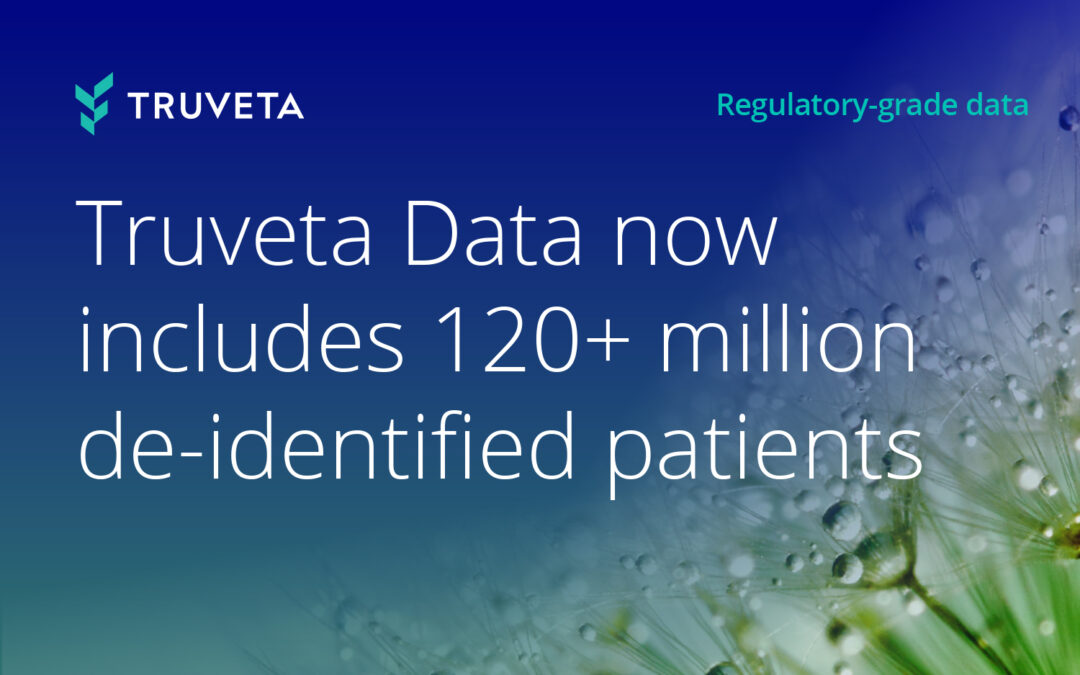Today, we’re excited to celebrate our latest innovation in Truveta across both Truveta Data and Truveta Studio.
Truveta Data has expanded to include new administrative data to enable more comprehensive analyses of healthcare outcomes and patient journeys.
We also have released two new capabilities in Truveta Studio: the ability to create feature tables in minutes and eligibility filters, which accelerate scientifically rigorous research with immediate access to Truveta Data and powerful analytics.
With the introduction of administrative data in Truveta Data and powerful new capabilities in Truveta Studio, Truveta can help researchers accelerate therapy development and adoption, while improving patient care.
New administrative data adds depth to complete EHR data
Truveta delivers the most representative, complete, and timely patient journey data, exceeding FDA standards of data quality, data provenance, and audit readiness. With EHR data from more than 120 million patients from leading US health systems—including clinical notes and images—linked with closed claims for more than 200 million patients from more than 100 payers, Truveta Data provides researchers with the most complete view of the longitudinal patient journey. Truveta Data is updated daily for the most current view of patient care. Truveta supports therapy development across research and development and clinical trials, and therapy adoption, including regulatory grade health economics and outcomes research (HEOR) and safety monitoring, while enabling the closing of care gaps.
With today’s announcement, Truveta Data expands to include new administrative data elements, which link clinical encounters with billing, provider resource allocation, and patient movements within healthcare facilities, offering new insights into healthcare outcomes, operations, and costs. These enhancements strengthen the link between administrative and clinical data, enabling longitudinal analyses of healthcare outcomes, predictive modeling of risk factors, post-market safety surveillance and medication adherence, and improved clinical trials.
Administrative data links billing information with clinical encounters, revealing patterns in patient visits, care delivery, and insurance coverage across multiple visits. It provides insights into patient access to medical services and tracks second-by-second tracking of patient movements during inpatient stays, offering a detailed view of care processes. Additionally, it distinguishes between healthcare sites from organizations, aiding in precise research and enhancing clinical trial design by clarifying where care was delivered, such as intensive care units (ICUs), surgical wards, or ambulatory infusion centers.
Accelerating scientifically rigorous research with Truveta Studio
Truveta Studio helps researchers accelerate scientifically rigorous research with immediate access to Truveta Data, powerful analytics, and AI.
Feature tables: Enhancing data validation and efficiency
Feature tables are the core unit of research analyses in Truveta Studio. Feature tables house all the specific variables critical for completing a study, including demographics, comorbidities, medical exposures, and outcomes. Researchers often spend up to 80% of their time cleaning data to get it in a feature table format before they’re able to conduct their research.
Truveta Studio now enables a researcher to build a feature table in minutes instead of weeks or months. Leveraging the speed of Prose (the query language built into Truveta Studio), researchers can add variables to their population of interest and immediately see row-level data previews and summary statistics of their population. Studio researchers can quickly pull variables of interest from Truveta Library, the largest repository of clinical data definitions.
Feature tables enable fast, powerful, and precise analytics, giving researchers confidence and accuracy in their insights.
Eligibility filters: Customizable study design
Truveta Studio’s new eligibility filters empower researchers to select care sites that meet specific study criteria, providing dynamic control over study design.
These powerful filters allow researchers to generate fit-for-purpose data on-demand using care site-specific variables—such as patient diversity, rare case volumes, or medical device usage—ensuring targeted, high-quality research.
With eligibility filters, researchers can refine datasets to study pediatric care sites, analyze hospitals with specific medical device usage, focus on nationally representative samples of minority patients, or limit studies to sites experienced in managing rare diseases.
Click here to learn even more about the unprecedented scale of Truveta Data, or here to learn more about the powerful features in Truveta Studio.








